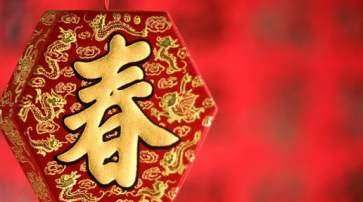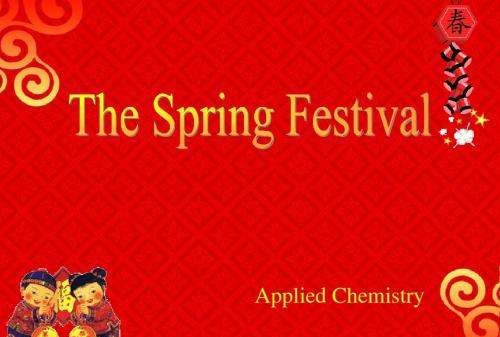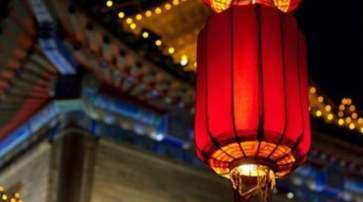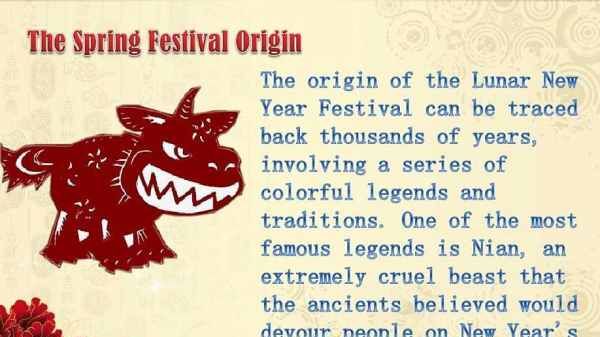本文目录
春节的来历英文版简短
春节的来历英文版
大家都知道春节是我国的传统节日,那么,春节到底是怎么来的呢?以下是为大家分享的春节的.来历英文版,供大家参考借鉴,欢迎浏览!

春节的来历英文版
the chinese new year is now popularly known as the spring festival because it starts from the begining of spring (the first of the twenty-four terms in coodination with the changes of nature). its origin is too old to be traced. several explanations are hanging around. all agree, however, that the word nian, which in modern chinese solely means "year", was originally the name of a monster beast that started to prey on people the night before the beginning of a new year.
one legend goes that the beast nian had a very big mouth that would swallow a great many people with one bite. people were very scared. one day, an old man came to their rescue, offering to subdue nian. to nian he said, "i hear say that you are very capable, but can you swallow the other beasts of prey on earth instead of people who are by no means of your worthy opponents?" so, it did swallow many of the beasts of prey on earth that also harrassed people and their domestic animals from time to time.
after that, the old man disappeared riding the beast nian. he turned out to be an immortal god. now that nian is gone and other beasts of prey are also scared into forests, people begin to enjoy their peaceful life. before the old man left, he had told people to put up red paper decorations on their windows and doors at each year's end to scare away nian in case it sneaked back again, because red is the color the beast feared the most.
from then on, the tradition of observing the conquest of nian is carried on from generation to generation. the term "guo nian", which may mean "survive the nian" becomes today "celebrate the (new) year" as the word "guo" in chinese having both the meaning of "pass-over" and "observe". the custom of putting up red paper and firing fire-crackers to scare away nian should it have a chance to run loose is still around. however, people today have long forgotten why they are doing all this, except that they feel the color and the sound add to the excitement of the celebration.
关于春节的英文词语
春节 The Spring Festival
农历 lunar calendar
正月 lunar January; the first month by lunar calendar
除夕 New Year's Eve; eve of lunar New Year
初一 the beginning of New Year
元宵节 The Lantern Festival
灯谜 riddles written on lanterns
灯会 exhibit of lanterns
守岁 staying-up
春联 Spring Festival couplets
剪纸 paper-cuts
年画 New Year paintings
买年货 special purchases for the Spring Festival do Spring Festival shopping
敬酒 propose a toast
灯笼 lantern:a portable light
烟花 fireworks
拜年 pay New Year's call; give New Year's greetings; New Year's visit
禁忌 taboo
去晦气 get rid of the ill- fortune
祭祖宗 offer sacrifices to one's ancestors
压岁钱 gift money; money given to children as a lunar New Year gift
辞旧岁 bid farewell to the old year
扫房 spring cleaning; general house-cleaning
习俗 Customs
过年 Guo-nian; have the Spring Festival
对联 poetic couplet:two successive rhyming lines in poetry
爆竹 firecrackers (People scare off evil spirits and ghosts with the loud pop.)
红包 red packets (cash wrapped up in red paper,symbolize fortune and wealth in the coming year.)
舞狮 lion dance (The lion is believed to be able to dispel evil and bring good luck.)
舞龙 dragon dance (to expect good weather and good harvests)
戏曲 traditional opera
杂耍 variety show; vaudeville
;春节的来历和风俗简短英语
英文版:
The Spring Festival falls on the 1st day of the 1st lunar month,often one month later than the Gregorian calendar.It originated in the Shang Dynasty (c.1600 BC-c.1100 BC) from the people's sacrifice to gods and ancestors at the end of an old year and the beginning of a new one.
翻译:春节是农历正月初一,通常比公历晚一个月。它起源于商朝(约公元前1600年至公元前1100年),源于人们在元旦末和新的一年初祭祀神和祖先。
扩展:春节,即农历新年,一年之岁首,传统上的“年节”。俗称新春、新岁、新年、新禧、年禧、大年等,口头上又称度岁、庆岁、过年、过大年。春节历史悠久,由上古时代岁首祈年祭祀演变而来。万物本乎天、人本乎祖,祈年祭祀、敬天法祖,报本反始也。春节的起源蕴含着深邃的文化内涵,在传承发展中承载了丰厚的历史文化。在春节期间,全国各地均有举行各种庆贺新春活动,热闹喜庆气氛洋溢;这些活动均以除旧布新、迎禧接福、拜神祭祖、祈求丰年为主要内容,形式丰富多彩,带有浓郁的各地域特色。

春节的由来英语介绍
春节的由来英语
每逢春节来临,人们就有了一周的休息时间,不管家离得有多远,都会回家过年。你们对春节的来历和习俗有多少的了解吗?以下是由我为大家收集整理的英语春节的由来,欢迎大家学习参考。

一、春节来历的英文介绍
Origin of the Spring Festival
Spring Festival is the lunar Suishou,is also our ancient traditional festivals.Ancient-off "year"is not in the twelfth lunar month on the 29th or on the 30th,but in the "wax on",that later,"Laba."Southern and Northern Dynasties later,the "wax Festival"to the end of the year.To the Republican era,the switch to Gregorian calendar was only then that the lunar year is called "Spring Festival",because the Spring Festival is generally in the "Spring,"both before and after.
翻译:春节,是农历的岁首,也是我国古老的传统节日.古代过“年”不是在腊月二十九日或三十日,而是在“蜡日”,即后来的“腊八”.南北朝以后,把“蜡祭”移至岁末.到了民国时 ,改用阳历,才把阴历年叫“春节”,因为春节一般都在“立春”前后。
Spring Festival is China's biggest and most exciting festival of an ancient tradition.Commonly known as "Chinese New Year."According to China's Lunar New Year,the first month who started in ancient times known Mongol Yuan Chen,Yuan-cheng,Yuan Shuo,New Year's Day and so on,commonly known as New Year's Day,as well as the previous day,moving in,three new moon,three North Korea,the three began,ternary,etc.Do not say,which means the first month who started this is the year,month,day three start.
翻译:春节是我国最盛大、最热闹的一个古老传统节日。俗称“过年”。按照我国农历,正月初一古称元日、元辰、元正、元朔、元旦等,俗称年初一,还有上日、正朝、三朔、三朝、三始、三元等别称,意即正月初一是年、月、日三者的开始。
Chinese New Year,by definition is a spring festival.Spring,Vientiane update,a new round of sowing and harvesting season is beginning.People have every reason to dancing and singing to welcome the holiday.Thus,before the Spring Festival red paper pasted on the door face,yellow-word New Year's Message.
翻译:春节,顾名思义就是春天的节日。春天来临,万象更新,新一轮播种和收获季节又要开始。人们有足够的理由载歌载舞来迎接这个节日。于是,节前就在门脸上贴上红纸黄字的新年寄语。
The another name is called the Spring Festival Chinese New Year."Year"what is it?Is a kind of bad luck for people's imagination in animals."Year"the one.Trees pride had Baicao no life;"year"one"off"and,all things grow,flowers everywhere."Year"How can the past?You need to use whip shelled,so have the custom of burning firecrackers.In 1993,the Beijing Municipal People's Government promulgated a law to ban fireworks,so that this continuity throughout the ages for centuries the custom of the past.
翻译:春节的另一名称叫过年。“年”是什么呢?是一种为人们带来坏运气的想象中的动物。“年”一来。树木凋蔽,百草不生;“年”一“过”,万物生长,鲜花遍地。“年”如何才能过去呢?需用鞭炮轰,于是有了燃鞭炮的习俗。1993年,北京市人民政府颁布了禁放烟花爆竹的法律,使这一沿续了几百年的习俗成为历史。
Spring Festival is a family reunion holiday,which is very similar to Christmas in the West.Away from home when the children returned to their parents at home to travel long distances.Real the night before Chinese New Year is called "New Year's Eve",also known as "Reunion Night","group years."From the traditional New Year's Eve celebrations continued until the fifteenth day Lantern Festival.Festive atmosphere,to last a month.Holiday movies before Jizao,worship of ancestors,to eliminate contamination.To be posted on the 30th Door God,couplets,flag,eating dumplings,fireworks,New Year's Eve,"Shou Sui"and other ceremonies; younger generation who started their elders to pay the first month,and then to the New Year with relatives and friends.When he met friends and relatives for the first time.Say,"congratulated the new hi","Kung Hei Fat Choi","Congratulations,""Happy New Year"and then congratulated each other.
翻译:春节是个亲人团聚的节日,这一点和西方的圣诞节很相似。离家的孩子这时要不远千里回到父母家里。真正过年的前一夜叫“除夕”,又叫“团圆夜”,“团年”。传统的庆祝活动则从除夕一直持续到正月十五元宵节。喜庆气氛要持续一个月。正月初一前有祭灶、祭祖、扫除污秽。三十日要贴门神、对联、挂旗、吃饺子、放鞭炮,除夕“守岁”等仪式;正月初一晚辈向长辈拜年,然后至亲友家贺年。亲友第一次见面时,说些“恭贺新喜”、“恭喜发财”、“恭喜”、“过年好”等话,互相祝贺。
December 23,1949,the PRC Central People's Government provides for an annual Lunar New Year holiday 3 days.Chinese New Year-China the public is most solemn,the most lively of an ancient traditional festivals.
翻译:1949年12月23日,中华人民共和国中央人民政府规定每年春节放假3天。春节——我国民间最隆重、最热闹的一个古老传统节日。
二、春节习俗的英文介绍
A series of colorful celebration activities begin on the first day of thefirst lunar month.
从农历正月初一开始的节庆活动可谓丰富多彩,多种多样。
After the Spring Festival, all kinds of entertainment programs used to be given in the rural areas in China.Just like the flower exhibition in Beijing now, the entertainment programs include walking on stilts, taking a boat on ground and operas.
春节过了以后,就是在过去中国的农村里边,文艺的活动逐渐地展开了,有各种的文艺节目,像我们现在看到的北京花会一样,高跷、旱船,另外就是唱戏。
No matter in the city or in the countryside, all the people will do one thingthat is to extend Spring Festival greetings. This activity begins at firstbetween family members.
不管是城里人,还是在农村,人们都要做的一件事就是拜年。民间流行的'拜年活动先是从家里开始的。
What does the holiday mean?
这个节日有什么含义吗?
The term "pass year" is used for the Spring Festival (Chinese New Year). The word "Year" in Chinese characters used to mean a horrible beast. To combat the beast, the Chinese hang "good luck" wishes on red paper on the door and use fireworks in the belief that the beast fears red and fire. This tradition in many ways resemblethe Western belief of using garlic and crosses to fight vampires.
中文中“过年”这个词组用以表示对春节(中国新年)的庆祝。“年”这个字在中文里是一种恐怖的怪兽。因为“年”害怕红色和火,所以中国人会在门上悬挂“春联”写上美好祝福,并放鞭炮来赶跑它。这个传统有点类似西方人用大蒜和十字架吓跑吸血鬼的传统。
Why New Year is so special?
为什么新年那么特别呢?
The Chinese zodiac features 12 animals in the sequence of Rat, Ox, Tiger, Rabbit, Dragon, Snake, Horse, Sheep, Monkey, Rooster, Dog, and Pig. This year is the year of Tiger. Each animal represents a different "personality". According to legend, people held a conference with all the animals, informing them that they would pick the 12 to represent the zodiac. However, in spite of being fast, the cat was not picked as its then-close friend, the rat, did not wake it. This action sparked off a rivalrythat continues till this day.
中国的十二生肖代表了十二种动物,他们的顺序是:鼠、牛、兔、龙、蛇、马、羊、猴、鸡、狗和猪。今年是虎年。每一种动物有他们自己的“性格”。根据传说,人们当初和动物们开了一个会,最先到会的动物们就可以进入十二生肖。而身为猫最好的朋友,老鼠却没有把猫叫醒去开会。因此,它们之间的战争一直持续到今天。
What do people do?
那人们在新年都干啥呢?
Eat, eat again, and then eat some more! As the old Chinese saying goes: food is everything.
吃、接着吃、再吃更多东西!就跟一句中国古话说的那样:食物即一切。
The tradition is to have different main courses everyday from the 1st day of the New Year to the 15th day of the New Year, from Jiao Zi (dumplings), noodles, spring rolls, sticky rice cakes, and Tang Yuan (stuffed rice balls). Besides culinarysatisfaction, each food has a meaning as well: for instance, Jiao Zi looks like gold, implying a wealthy year ahead.
传统就是,从新年第一天开始直到正月十五,每天都要吃不同的主菜。从饺子、面条、春卷、年糕到汤圆。除了祭好五脏庙以外,每一种食物也有含义:比如饺子看起来就像金元宝,这意味来年的丰衣足食。
Besides eating, young people visit older family members and kids are blessed with a red pack of "lucky" money. And then, people gather and eat again (!), leading to a lot of advertisements about fitness right after the Chinese New Year holiday.
除了吃以外,年轻人要去拜会家里的老人家,而小盆友们就有大把压岁钱拿。跟着,人们又聚在一起吃,所以节后中国就会出现很多减肥广告……
Happy Chinese New Year
;春节的来历英语介绍
Origin of the Spring Festival
Spring Festival is the lunar Suishou,is also our ancient traditional festivals.Ancient-off "year"is not in the twelfth lunar month on the 29th or on the 30th,but in the "wax on",that later,"Laba."Southern and Northern Dynasties later,the "wax Festival"to the end of the year.To the Republican era,the switch to Gregorian calendar was only then that the lunar year is called "Spring Festival",because the Spring Festival is generally in the "Spring,"both before and after.

翻译:春节,是农历的岁首,也是我国古老的传统节日。古代过“年”不是在腊月二十九日或三十日,而是在“蜡日”,即后来的“腊八”。南北朝以后,把“蜡祭”移至岁末。到了民国时 ,改用阳历,才把阴历年叫“春节”,因为春节一般都在“立春”前后。
春节习俗的英文介绍:
A series of colorful celebration activities begin on the first day of thefirst lunar month.从农历正月初一开始的节庆活动可谓丰富多彩,多种多样。
以上就是关于春节的来历英语介绍50字 ,春节的来历英文版简短的全部内容,以及春节的来历英语介绍50字 的相关内容,希望能够帮到您。

